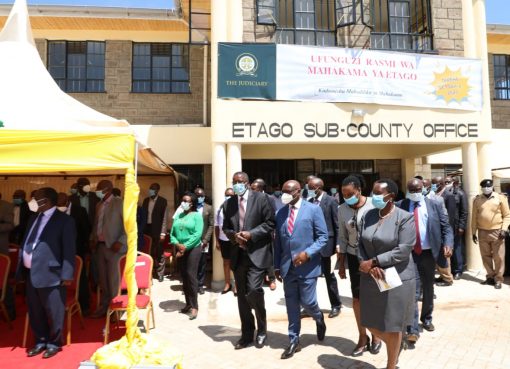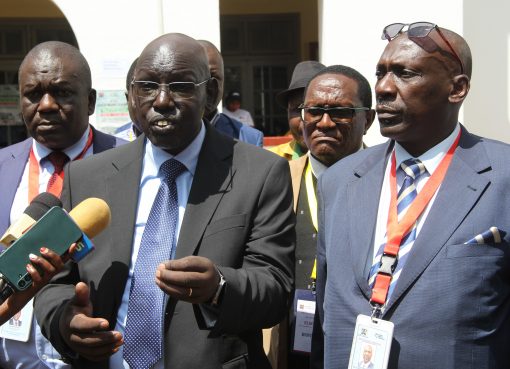The Nakuru County Government is partnering with the Kenya Agricultural and Livestock Research Organization (KALRO) and the Cereal Growers Association (CGA) to increase the uptake of new agricultural technologies by small scale farmers to avoid losses as a result of climate change and address food insecurity.
The collaboration also aims to give more attention to research and knowledge sharing on how to incorporate technology in farming and variety of crops to invest in.
It will further emphasize adoption of mechanized farming, innovation in areas like use of drought resistant varieties of seeds, environment friendly farming practices and better post-harvest management to reduce losses.
The County Executive Committee Member for Agriculture, Dr. Immaculate Nthunje Maina said the devolved unit had set up structures aimed at preparing and empowering farmers to adapt to climate change through a project known as Climate Smart Agriculture.
“Kenya currently imports 30 percent of its food products, mainly staples, and it is predicted that by the year 2050, this figure will have peaked to 85 percent. By this time our population is projected to be 95 million. The implications are grim and in the face of climate change, they are likely to be worse,” noted the CEC
Speaking during the Nakuru Farmers Open Day, held at KALRO Njoro grounds whose theme was “Innovative technologies for enhanced agricultural productivity” Dr. Maina stated that digitalizing the devolved unit’s agriculture was one of the priority areas of the partnership.
This she said would help ease agricultural processes, boost electronic commerce and provide open data for future farm use.
“When farmers embrace numerous mobile apps available they acquire genuine information on proper and certified planting materials. We want smallholder growers to appreciate that the apps also help farmers identify and prevent crop pests and diseases that affect crops, and know the time for planting seeds,’’ she observed.
“Information Communication Technology will be harnessed for overall agricultural and rural development. We are ensuring that developers of the apps make them simple for the rural farmer to receive necessary information regarding land preparation, planting and climate change. We also hope these interventions will help reduce post-harvest loss that remains a big challenge in the country,” she added.
The event that was jointly organized by the County administration, CGA and KALRO attracted over 1,200 small and medium scale farmers and more than 20 exhibitors.
The KALRO Njoro Centre Director, Dr. Godwin Macharia said impacts of climate change ranging from higher temperatures, extreme weather patterns, and worsening disease and pest problems could significantly reduce the yields of important grain crops, such as beans, maize, potato, and wheat.
He observed that climate change had brought notable shifts in the suitability of agricultural land for a wide variety of crops, which was sometimes occasioned by biting drought or flash floods.
“It is time we taught our farmers to embrace new drought-tolerant rice and beans, insect- and disease-resistant cassava, and superior tropical forages adapted to drought, flooding, and other harsh conditions,” he said.
“Last year KALRO launched 14 mobile applications designed to help farmers transfer technologies that enhance agricultural productivity and trade. The new paradigm shift that will help lower prices for consumers, contribute to smart agriculture and motivate farmers to increase their production. The mobile apps target crops such as avocado, banana, cassava, maize, guava, cowpea and potato,” said Dr Macharia
Since the mobile apps may compliment few agricultural extension officers on the ground the KALRO Njoro Center Director said they provide farmers with much needed information on weather data and how to use it to their advantage in planning farming activities against the background of climate change.
Dr. Macharia said farmers were also being enlightened to be cautious about some of the latest technologies that could lead to food shortage by damaging the environment.
“To achieve sufficient food production and economic empowerment we are all concerned about high yields and that will be possible through adoption of modern technology. However, it is important to deploy safe and responsible technology so that we don’t endanger the environment by using hazardous chemicals,” he told the farmers.
The Cereal Growers Association Operations Manager, Sammy Osebe observed that the use of climate-smart agricultural innovations and technologies to adapt to or mitigate effects of climate change is often limited mainly to large-scale farmers.
“With climate change you find rainy seasons have become shorter therefore there is need for efficiency in all the stages including land preparation, planting, harvesting, grading, transportation and storage,” he said.
“Awareness propagation to small scale farmers for implementation at farm level and climate proofing agricultural value chains will be critical,” he said.
During the field day, farmers were encouraged to invest in irrigation instead of only relying on rain-fed agriculture. They were further challenged to join hands to construct water pans for irrigation purposes.
Those from rural parts of the devolved unit were trained on the benefits of mechanization in their farming to boost yields.
Farmers were also encouraged to join cooperative societies given that working in groups can increase their bargaining power and order inputs in bulk therefore, lowering their expenditure besides increasing their chances of accessing markets at better prices.
By Anne Mwale




